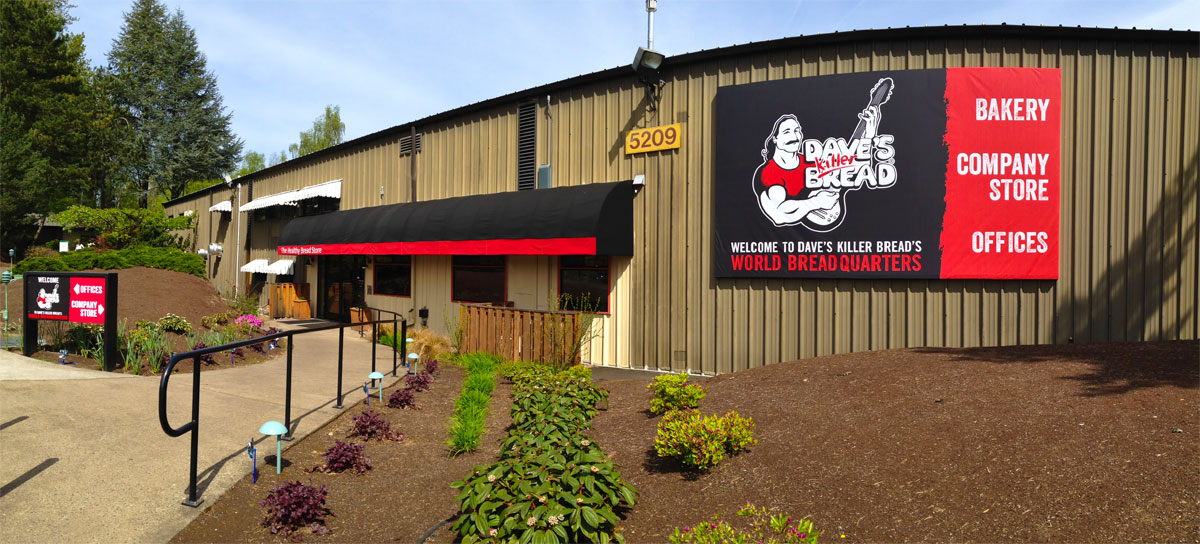Becoming the top-selling organic bread in the US is no small feat, and the story of the Milwaukie, Oregon-based company is unique in many ways. But key to its growing popularity is responding to consumer preference for a highly nutritional, entirely organic, wholegrain and Non-GMO product, available in varieties matching many taste palates and caloric requirements. And it doesn’t hurt that Dave’s Killer Bread has a social conscience—one-third of its employees are people with criminal backgrounds, just like Dave Dahl, formulator of the original recipes whose guitar-rockin’ logo is found on each of the 15 bread products.
Began as neighborhood bakery
The Dave’s Killer Bread (DKB) story begins in 1955, when Jim Dahl purchased a neighborhood bakery in Portland. A pioneer in baking sprouted wheat bread, Jim brought his son Glenn and his siblings into the bakery at an early age. The work suited Glenn, but Dave was not enthusiastic—struggling with depression, he fell into drug use and was sentenced to prison four times, to serve 15 years. While Glenn continued to grow the bakery, NatureBake, Dave began medication that helped his depression, and earned an early release from prison.
Welcomed back into the family business, Dave set out to develop an organic, seeded, nutritionally packed loaf—his Blues Bread, rolled in organic blue cornmeal, was a smash hit when debuted at the Portland Farmers Market in 2005. Four varieties—Blues, Nut & Grains, Good Seed, and Rockin’ Rye—became permanent Market fixtures. Soon, retailers Whole Foods, New Seasons, and Fred Meyer were selling Dave’s Killer Bread. Distribution through Costco and other major retailers solidified national exposure. Today, over 300 employees produce bread for all 50 states and Canada. The company was selected as one of Oregon’s most admired companies in 2014 and won a “Best of West 2014” award at Natural Products Expo West.
National rollout
Last August, CEO John Tucker announced that DKB had been acquired by Flowers Foods for $275 million. The 100-year-old company is the second largest baking company in the US; its large distribution capacity will enable Dave’s Killer Bread to quadruple its bread production and reach. The Oregon facility has expanded its capacity, and a state-of-the-art organic bread facility in Tuscaloosa, Alabama will produce 1 million units of Dave’s bread each week. DKB added 9,000 new retailers through its national rollout in April. “We’re on our way to a national name,” said Dan Letchinger, vice president marketing. “There’s a lot of opportunity for the organic bread market, with only 6 percent of households now buying organic.”
Non-GMO Project verified
All of Dave’s breads are Non-GMO Project verified—adding the Project’s seal was a natural extension of the brand. “It’s a badge of honor, conveying a clean label, which has always been a big part of the Dave’s Killer Bread experience,” Letchinger said. “We got verified because the winds are blowing in the non-GMO direction—just because you’re organic doesn’t communicate non-GMO. This provides double assurance and consumers are looking for it.” He added that achieving NGP verification was not difficult, because their ingredients were already organic and non-GMO. “It’s just getting all the paperwork filled out,” he said.
The high protein, organic hard red spring wheat is sourced primarily from Montana and Alberta, Canada. DKB is working to build relationships with more farmers in Washington and Oregon to source more organic supply. Dave’s also supports organic seed development, funds research and trials, and provides financial support for organic farmers such as the Canadian Prairie Organic Grain Initiative (POGI).
Offering a second chance
Inspired by the impact of Dave Dahl’s contribution to the business, the Dave’s Killer Bread Foundation was established in 2015 to power “Second Chance” employment. The foundation sponsors summits to encourage employers to hire persons with criminal records, and provides resources for solving reentry challenges.
At DKB, employees with a criminal background fill positions from entry level to managerial positions, and are some of the company’s most valued and trusted workers.
Poised to seize the organic bread market opportunity, the future of Dave’s Killer Bread looks bright. Despite a gluten-free trend, sandwiches are still the #1 US food—but bread companies need to be exciting, healthy, transparent and able to “pack a punch.”
“Bread overall as a category can be boring,” Letchinger said. “But in [Dave’s bread] the flavor and texture really stand out. We call it killer.”









